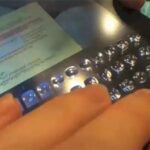 Hardware manufacture, Tactus Technology recently showed off its latest innovation that aims to bring the comfort of real keys to touchscreen tablet devices. The Californian company showed off the new technology during the recent Consumer Electronics Show (CES) which was held in Las Vegas. Their invention enables flat, touchscreen devices to instantly create real life pop-up keys that allow users to type as if using a regular keyboard – an innovation likely to excite those who prefer the feel of real keys when using mobile devices to type text for documents, emails and instant messages.
Hardware manufacture, Tactus Technology recently showed off its latest innovation that aims to bring the comfort of real keys to touchscreen tablet devices. The Californian company showed off the new technology during the recent Consumer Electronics Show (CES) which was held in Las Vegas. Their invention enables flat, touchscreen devices to instantly create real life pop-up keys that allow users to type as if using a regular keyboard – an innovation likely to excite those who prefer the feel of real keys when using mobile devices to type text for documents, emails and instant messages.
The technology works by replacing the hard glass screens that are often found on tablets with a more malleable, plastic sheet. Underneath this sheet is a layer of liquid that can be manipulated to create bumps on the surface of screen. These bumps can then be used as buttons to interact with the device, like a built-in keyboard. When you’ve finished using the keyboard, the liquid drains from the bumps leaving the screen completely flat. This innovation could be the perfect solution to those who enjoy the range of applications available on touchscreen tablets but miss the tactility of a real keyboard. The implementation of the plastic screen does sacrifice some of the durability offered by glass screens but this is likely to be of little importance to those who prefer to type on real keys.
Tactus isn’t aiming to release a standalone tablet of their own but rather for other original equipment manufacturers (OEMs) to adopt the technology into their own devices. Tactus claims that the technology isn’t just limited to tablets and that it would be suitable for a wide range of devices from televisions to car based media systems. In a PDF released to potential adopters, Tactus describes the potential advantages and applications of their technology:
“Physical buttons have the potential to increase typing speeds, reduce data entry errors and make touch-typing and blind navigation on a touchscreen possible for the first time. It allows for the screen and keyboard to be combined into a smaller form-factor. Not having to reserve a separate space for buttons or keys also enables manufacturers to increase the size of their LCD displays and create entirely new forms of devices.”
Tactus has certainly created a stir within the industry with many speculating that it could become a regular feature on devices in the future. The company picked up a 2012 PCMag Technical Excellence Award alongside such established devices as the Raspberry Pi and other potential future innovations such as Google Glass.
